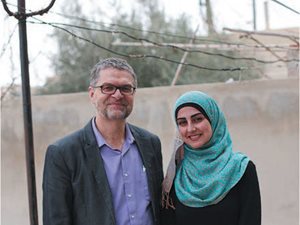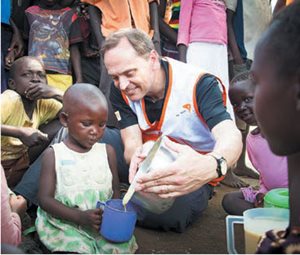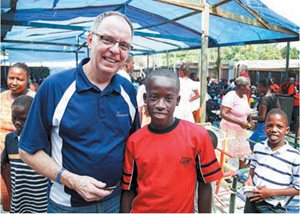
By Robert White
Republished with permission from Faith Today, Nov/Dec 2018. Photos above and right courtesy ERDO. ERDO has been providing food relief for Rohingya refugees who have fled Myanmar to Bangladesh and are living in refugee camps along the border.
Situations of extreme poverty and violence are dominating the current work of Canadian Christian international aid agencies. Some are concerned Canadians’ generous support might not meet the ever-growing need for relief, development and advocacy.
Two of the key situations for aid agencies in 2018 have involved refugees – the Rohingya, a group who fled by the hundreds of thousands from Myanmar to Bangladesh, and also refugees from Syria’s civil war.
TWO KEY SITUATIONS FOR AID AGENCIES IN 2018 HAVE INVOLVED REFUGEES – THE ROHINGYA AND THOSE FROM SYRIA’S CIVIL WAR.
"We were one of the few organizations able to work in Cox’s Bazaar [an area of Bangladesh] because we have a partner organization for development" there, says Ida Mutoigo, director of World Renew Canada, the development and disaster response arm of the Christian Reformed Church. This led the number of people helped by World Renew to climb from about 600,000 in the 2015/16 fiscal year to more than 790,000 in 2016/17 (more than 536,000 of them were disaster victims).
Another Canadian group providing food assistance for Rohingyas is Emergency Relief and Development Overseas (ERDO). The humanitarian agency of the Pentecostal Assemblies of Canada has helped 170,000, according to international development officer Akililu Hunque.
For Mennonite Central Committee (MCC) Canada, the focus has been on the ongoing Syrian crisis, says executive director Rick Cober Bauman. [See his photo at right with Rahaf Abdo from the Islamic Charity of Deir Attieh, Syria. EMILY LOEWEN / MCC CANADA]
"We’ve been involved in the Middle East for many decades, including Syria," he says. "The overall value of MCC’s response in Syria these last eight years is close to $50 million – it’s our largest single response since World War II."
This work spilled into Canada as MCC Canada resettled Syrian refugees. He notes in particular how churches, secular universities and municipalities have stepped up to sponsor families. Cober Bauman says there hadn’t been a similar response since the resettlement of Southeast Asian refugees (the so-called Vietnamese Boat People) in the late 1970s and early ’80s. [Editor's note: this text has been corrected. A reporting/editing mistake misquotes him in the print version to say that “one-third of refugees coming to Canada” have come via MCC, but in fact the “one-third” applies only to the past year, and only to BVOR refugees (Blended Visa-office Referred), both Syrians and others. From 2015 to 2018, MCC has helped 2,211 Syrian refugees, out of the 40,000-odd refugees Canada has taken in during that time.]
Other major work at agencies such as World Vision Canada this year was sparked by the recognition that extreme poverty and fragile contexts (where long-term humanitarian aid is needed) are on the rise. They’re now developing new models for tackling these challenges, says president and CEO Michael Messenger. [Photo at right shows him in Uganda. PAUL BETTINGS / WORLD VISION]
"World Vision is involved with development, relief and advocacy, and fragile contexts are places where all of those things get mixed together," he says. "We’ve been able to see some success in thinking through how to be responsive and flexible in both funding and approaches in fragile contexts."
Compassion Canada, which takes a different approach from most relief and development organizations by focusing on individuals instead of communities, has a different gauge for success. President and CEO Barry Slauenwhite sees success in the 300,000 children who have gone through programs at Compassion Haiti over its 50-year history (the group just held an anniversary celebration). [See his photo at right. REYNOLD MAINSE / COMPASSION CANADA]
 "We’re also celebrating the implementation of a new global youth development strategy which takes young adults beyond high school into vocational college, university. We currently have about 50,000 students in college, university, vocational training."
"We’re also celebrating the implementation of a new global youth development strategy which takes young adults beyond high school into vocational college, university. We currently have about 50,000 students in college, university, vocational training."
While accomplishments increase, the challenges aid agencies face are also on the increase.
"One thing we’re looking at is that crises are lasting far longer than in past," says Messenger. "If you were to look at a refugee who leaves home today, and how long they’re likely to be away from their home, it’s at least seven years. The average at the moment is 22 years. There are more people displaced from home today than there have been since the Second World War."
Messenger also says real progress has been made in the fight against poverty globally, but what they now see is "extreme poverty ‘on the run’ and fleeing to dark and dangerous places."
That danger can be seen in the rise of nationalism and the threats faced by both aid workers and those they work with.
"Nationalism shows itself in either a fear or dislike for international mission organizations that are seen to impact their population with Western ideas," says Slauenwhite. "There’s a real paranoia growing around the fear that a ministry like Compassion or other Bible-centric missions use humanitarian work to coerce or, worse, force people to become Christians."
Mutoigo says, "Some of the places where we have normally tried to get out to are now under a lot of insecurity. Our staff and even our local partners cannot access those communities as much anymore.
"We’re seeing humanitarian workers being attacked directly for work they do. Even in some of our partner churches, where the church leaders try to speak boldly to what is happening – some of their lives have been threatened."
MCC Canada has had to work from Beirut (in the neighbouring country of Lebanon) because they couldn’t send Canadian staff into Syria for a number of years, says Cober Bauman. "We were able to get in only for the first time in many years in 2017, and then I was part of a delegation in February 2018."
Both World Renew Canada and ERDO note climate change is another challenge [Photo at right shows the Bidibidi refugee camp in Uganda, where Dominic and his family were among those who received a latrine through World Renew’s South Sudan Refugee Crisis response. WORLD RENEW]. For ERDO, it’s recognizing when to respond.
"In a slow onset crisis such as drought, if we’re not able to respond in a timely manner, there will be a great loss not just of livelihoods, but also lives," says Hunque. "Before we started hearing reports of deaths, before we had high levels of malnutrition among children, we were able to act by providing food that reached people in a timely manner."
With the successes and challenges comes the need for more resources. Every agency can use more money, but prayer, volunteers and staff are also on their wish lists.
EVERY AGENCY CAN USE MORE MONEY, BUT PRAYER, VOLUNTEERS AND STAFF ARE ALSO ON THEIR WISH LISTS.
"Compassion’s work," says Slauenwhite, "is heavily in the area of spiritual formation. We rely heavily on prayer because it’s a spiritual battle for the soul of these children. It’s one of the most powerful things people can do, even if they don’t sponsor children with us."
Hunque adds, "Sometimes we don’t realize how important it is for us to be going before the Lord, seeking Him to provide."
Both in Canada and abroad, World Renew Canada has room for more volunteers, especially with its disaster response program.
"In our global volunteer program," says Mutoigo. "we’ll often place anywhere from 250 to 360 volunteers a year all around the world. This past year the number of volunteers we placed went to the highest number ever with 470 volunteers."
Not everyone has to be suited to physical work, especially in North America where disaster response includes assessment teams of "people that are simply able bodied, good with keeping records, and interviewing people who were affected by disaster to find out what kind of aid they need."
With a number of material resource centres in cities across the country, MCC looks for people, individually or in groups, willing to pack relief or health kits that will be "put in the hands of someone who might be displaced by natural disaster or war," says Cober Bauman.
All would agree with Messenger who suggests people learn about the world’s changing dynamics.
"It’s about becoming aware of the issues," Messenger says. "We want to make sure Canadians know there can be transformative change that not only improves lives, but actually builds peace and security. They can give not just of their resources, but share their voice."
LEARN MORE
Many of these agencies are also members of The Evangelical Fellowship of Canada, which offers a multisite search function at www.TheEFC.ca/Affiliates where visitors can enter keywords related to a specific place or disaster to find up-to-the-minute reports of what affiliated charities are doing.
Many are also members of the Canadian Foodgrains Bank (www.FoodgrainsBank.ca) and the Canadian Christian Relief and Development Association (www.CCRDA.ca).
Robert White is a freelance writer in Guelph, Ont.